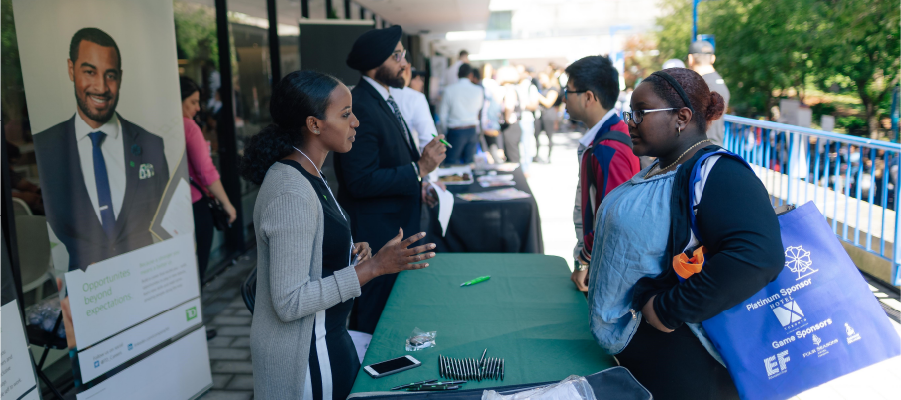Career Fairs

At a career fair, many employers that have positions to fill will promote them on campus or virtually with the intent of talking to potential candidates about their organization and the opportunities they have available. It's a great place to learn more about organizations, make connections, and potentially apply for jobs.
We typically run multiple in-person and virtual careers in the Fall and Winter semesters. All career fairs for Winter 2023 have been completed, but stay tuned to this page for more information about upcoming fairs when it becomes available!
If you go into a career fair without goals or a plan, it's easy to leave feeling depleted or unsure of what you accomplished. It's much more effective to decide what you want to gain from the experience and create a plan to achieve it.
Develop Goals
What are you hoping to get out of the career fair?
- Decide if you're going to network, apply to jobs, or find out more about what opportunities exist. Then create goals that will help you get there.
How many contacts do you want to make for the day?
- Quality trumps quantity! "It's much more valuable to have a great conversation with 1 person who is in your industry and doing work you're interested in, than to talk to 20 people who are not relevant to your industry."
For example:
Today, I’m aiming to learn more about what’s required for engineering tech internship opportunities with Toronto Hydro and other such companies who may offer valuable learning experiences. My goal is to ensure that I do my research about companies at the fair and connect personally with at least 5 recruiters, so that I can hear about their industry experiences and pass along my résumé.
Research, research, research
Find out which employers are expected at the event, especially the ones that align with your goals, by checking the Who's Hiring section of each career fair on this page.
Research your top choice of companies attending so you can:
- Create tailored resumes for them so that you stand out and make a good impression.
- Easily start a conversation by asking them about something you read online.
- Leave a strong impression with the employers that matter to you.
In your folder, bring:
- your targeted industry résumé so you can:
- Show the representatives or hiring managers at the career fair your resume and ask them to provide quick tips on how to stand out when you submit your application.
- Upload your updated resume to the applicant tracking system (ATS) with a cover letter that describes the interaction with the rep/hiring manager.
- your pitch (30-second self-statement)
- Your company is…(show off your knowledge about the company).
- I’m interested in …(explain why you’re interested in the employer).
- I can… (this is where you can sell yourself and your skills / experience)
- Researched question (show your knowledge of the company and turn the conversation back to them)
- if you have business cards, bring them, but don’t worry if you don’t.
Stand Out
Choose an outfit that helps you feel confident. This is often considered by employers to be a physical indication of your attitude towards yourself, and of your desire/expectations for employment. Business or business casual is usually acceptable (page 57 of our (PDF file) Undergraduate Career Compass explains more), but make sure to check the culture of the organization by visiting their LinkedIn page or company website.
Focus on your non-verbal cues. Are you:
- smiling naturally?
- establishing eye contact?
- conveying energy and enthusiasm?
- introducing yourself?
- adopting a firm, dry handshake (if you shake hands)?
- checking name tags?
Practice, practice, practice. Even if you are shy, these are skills you can learn and improve.
Use open-ended questions to your advantage and avoid inquiries that generate only a "yes" or "no" response.
For example:
Avoid closed questions = “Do you have any open positions?”
Ask open-ended questions = "What are 3 ways a student could get involved at your organization?”
Prepare two or three questions ahead of time about each company you want to talk to. Also, prepare how you want to let them know about your interest in working at their company.
At the first opportunity after speaking to an employer, jot down some of the following pieces of information:
- who have you met?
- what new opportunities are available at that company?
- information you learned about their hiring process or dates
- notes about when to contact them for an additional or follow-up conversation
Quick Tip: If you are given business cards by a hiring manager at the career fair, the back of a business card is a great place to record notes. You can also use your mobile phone.
Follow up with your new contacts and leads via LinkedIn, e-mail and other methods in order to stay connected and to say thank-you. Remember to let your new connection know where you met and anything memorable that you might have spoken about.
Quick Tip: Keep your LinkedIn app on your mobile device ready and ask the employer representative if they would be willing to connect with you on LinkedIn. If they say ‘yes’, find their profile, have them confirm that it is theirs, and send a personalised invitation based on information you heard during your conversation so they remember who you are and add you to their network.
Look at our Workshop & Events Calendar and sign up for one of our Prepare for the Career Fair workshops to learn more and practice some of these skills.